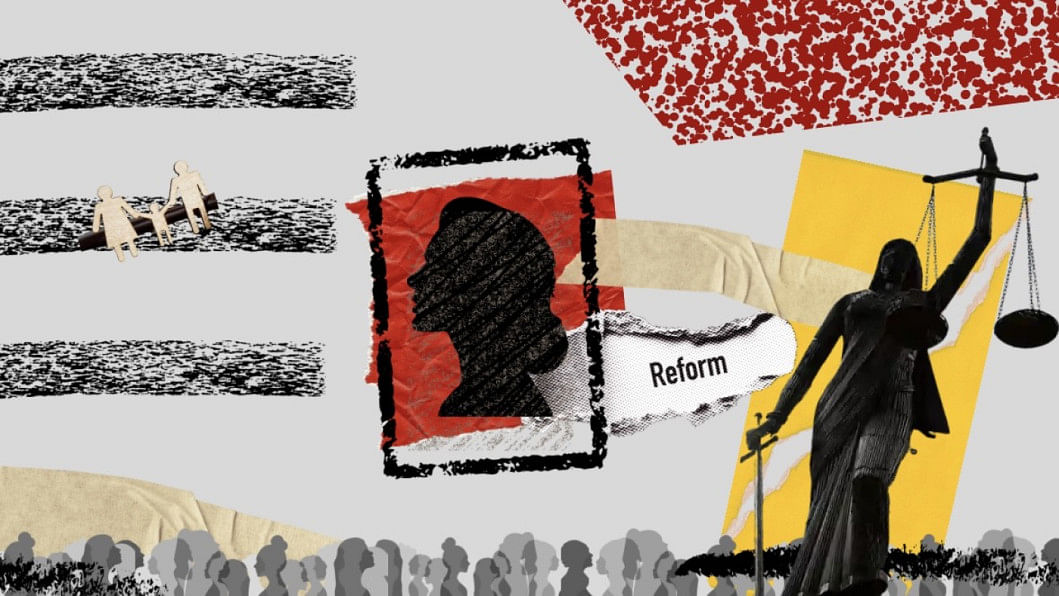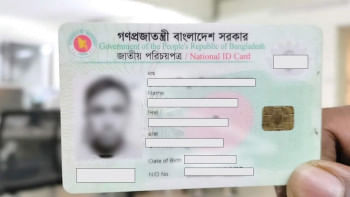Women's Affairs Reform Commission: Recommendations, disputes and the way forward

Of the 11 commissions formed by the interim government as part of the state reforms initiative, most controversies are evoked around the recommendations of the Women's Affairs Reform Commission. The commission made 433 recommendations grouped under 15 thematic areas to eliminate existing discrimination against women. Some of the recommendations have been called anti-religious, and demands have been raised to dismiss the entire commission.
It is unlikely that all the recommendations of a reform commission will be acceptable to all stakeholders. Therefore, an acceptable solution can be found through discussion and debate. For this, first, we need to know the details of the commission's recommendations and analyse their pros and cons. This article will first highlight the important recommendations of the Women's Affairs Reform Commission, then discuss the controversial issues.
The themes around which the commission has proposed reforms include the constitution and law, public administration, political system, education, health, economy, labour and employment, social security, media, sports and culture, disasters and climate change, etc. Notable among the recommendations on constitutional and legal reform are: the elimination of all discriminatory and contradictory constitutional provisions and laws; adoption of a uniform family code that would be voluntary for all religious communities on all matters relating to marriage, divorce, and inheritance; recognising equal guardianship of fathers and mothers; decriminalising sex work and recognising it in labour laws; and recognise forced sex within marriage as rape in criminal law.
It has been recommended that the total number of seats in parliament be increased to 600, with 300 reserved for women. To ensure women's representation at the local government level, each ward should have one general seat and one women's seat.
The recommendations the commission made on economic rights include amending the law to ensure women's rights to khas land settlement and forest resources; recognising women as fishermen through registration; amending the inheritance law to ensure women's equal inheritance of property; providing necessary services by creating favourable employment policies for women in the formal sector, such as establishing child day care centres, creating a work environment free from sexual harassment by formulating a code of conduct for the workplace; simplifying loan terms for women entrepreneurs; ensuring at least 40 percent female representation on the boards of directors and management levels of business and financial institutions; facilitating young women's access to employment through science, technology, engineering and mathematics education and career counselling related to the labour market, etc.
Under the health-sector-related recommendations, the commission recommended formulating and implementing special policies to control unnecessary Cesarean operations. Other recommendations include strengthening maternal and neonatal mortality monitoring and review activities, increasing access to healthcare for women with disabilities, removing barriers to access to birth control methods and menstrual regularisation treatments, and amending the National Elderly Policy 2013 to provide special protection to elderly women.
Despite the increase in women's participation in the country's labour force, they face widespread discrimination and problems. On average, 85 percent of the country's workers are employed in the informal sector, for women the rate is even higher—96.6 percent, with no guarantee of fair wages, maternity and paternity leave, and social security. For these working women, the commission made several important recommendations, including: setting a minimum wage for male and female workers in every sector to reduce wage inequality; establishing strict monitoring measures to ensure equal pay for equal work; amending the labour law to increase maternity leave to six months and introduce paternity leave; establishing child-day-care centres both for the formal and informal workers; adopting specific policies in the provision of services by government and private hospitals to ensure the health safety workers' children in the institutional and non-institutional sectors, etc.
The commission has recommended amending laws and regulations to ensure the protection, dignity, and welfare of migrant and returnee women workers, and transparency and accountability of recruitment agencies. It has called for the inclusion of health, rights, security, and weekend issues in the bilateral agreement on immigration, and to make the embassy's labour service officers more active.
The existing social security allocation in the country is very inadequate and corrupt, with women being the biggest sufferers. Often, they stand on the streets for hours for ration but return empty-handed. For this reason, the commission has called for providing any social security assistance, including subsidised food sales, in a dignified and respectful manner. The report also recommends introducing a special social security package for women employed in the domestic and informal sectors to provide health, accident, maternity and postnatal insurance benefits, unemployment benefits, and retirement benefits at low cost. Besides, reconsidering the age limit for old age allowance and creating a special emergency support fund for emergency services for taking effective measures to prevent and remedy violence against women has been recommended.
If these recommendations are implemented, even partially, the lives and livelihoods of women will significantly improve. But we are observing such a debate being created over a few recommendations that many other important recommendations are being buried under their shadow. The reform recommendations for equal inheritance of property for women, uniform family law, marital rape, recognition of sex work, etc. are being termed as anti-religious. However, the reality is not so simple. There is no uniform law or regulation on these issues in all Muslim-majority countries of the world.
Women's inheritance of property has long been a subject of debate in Muslim-majority countries and keeping in mind the changing socio-economic and political context, Ijtihad (independent reasoning of scholars) and its various forms such as Ijma (consensus of scholars), Qiyas (analogy), Istihsan (juristic preference), and Maslahah Mursalah (public interest) are being used to apply religious rules in this regard.
In his book, Family Law Reform in The Muslim World, Indian legal scholar Tahir Mahmood, a former member of the Law Commission of India and former dean of the Faculty of Law at the University of Delhi, showed that with regard to family law, Muslim countries are divided into three groups: i) countries that follow the classical Sharia family law of Islam and do not make any reforms or changes; ii) countries that completely ignore the Sharia family law and replace it with modern law applicable to all citizens irrespective of religion; and iii) countries that implement the Sharia family law reformed with various regulations and provisions.
Examples of countries following the classical Sharia law, especially for family and personal matters, are Saudi Arabia, Yemen, Bahrain, Kuwait etc. Muslim-majority countries like Turkey, Albania and Tanzania follow a secular family law which gives equal property rights to women. The countries which have introduced reforms to the locally prevalent schools of Muslim law and follow a mixed system are Sudan, Jordan, Syria, Tunisia, Morocco, Algeria, Iraq, Iran and Pakistan.
Therefore, when it comes to equal property rights or uniform family laws, examples of other Muslim countries can guide us in our thinking and discussions. Moreover, the Women's Affairs Reform Commission has not called for a uniform family law to be made mandatory, but recommended keeping it optional for all communities.
Legal recognition of sex workers is a complex issue with various arguments for and against it. Those against legal recognition believe that it will encourage prostitution which is an exploitative and degrading system for women. On the other hand, those in favour of it argue that due to lack of legal recognition, sex workers are deprived of various types of social protections, including healthcare. As a result, legal recognition is necessary to protect them until the situation comes when the profession will be abolished.
In their article, Rape in the Secrecy of Marriage: Need for Criminalization, postgraduate researcher Saloni Pradhan at the University of Leicester, and Shiv Chhatrala, a policy researcher based in Karnataka, India, mentioned that 150 countries have criminalised marital rape. The basic argument is while in marriage the spouse has the right to have sex with his/her partner, that right cannot be imposed by force, coercion or abuse of authority. Bangladesh is one of the few countries in the world, where the matter remains as before. According to the Violence Against Women Survey 2024 conducted by Bangladesh Bureau of Statistics, 29 percent of married women experience sexual violence from their intimate partner at some point in their life and 9.4 percent experienced such violence in the past year. It is in such a context that the Women's Affairs Reform Commission has recommended recognising marital rape as a crime.
In the existing patriarchal social reality, it is natural to have differences of opinion and debate about some of the recommendations of the Women's Affairs Reform Commission. But one cannot demand the abolition of the entire commission just because of differences of opinion on a few issues. There are many differences on the recommendations of other commissions like the constitution or electoral reform commission, but no one is demanding to abolish them. Rather, initiatives have been taken to build consensus through dialogue and discussions with political parties and organisations through the National Consensus Commission. Similar initiatives should be taken regarding the recommendations of the Women's Affairs Reform Commission.
Kallol Mustafa is an engineer and writer who focuses on power, energy, environment, and development economics. He can be reached at [email protected].
Views expressed in this article are the author's own.
Follow The Daily Star Opinion on Facebook for the latest opinions, commentaries and analyses by experts and professionals. To contribute your article or letter to The Daily Star Opinion, see our guidelines for submission.

 For all latest news, follow The Daily Star's Google News channel.
For all latest news, follow The Daily Star's Google News channel. 






Comments